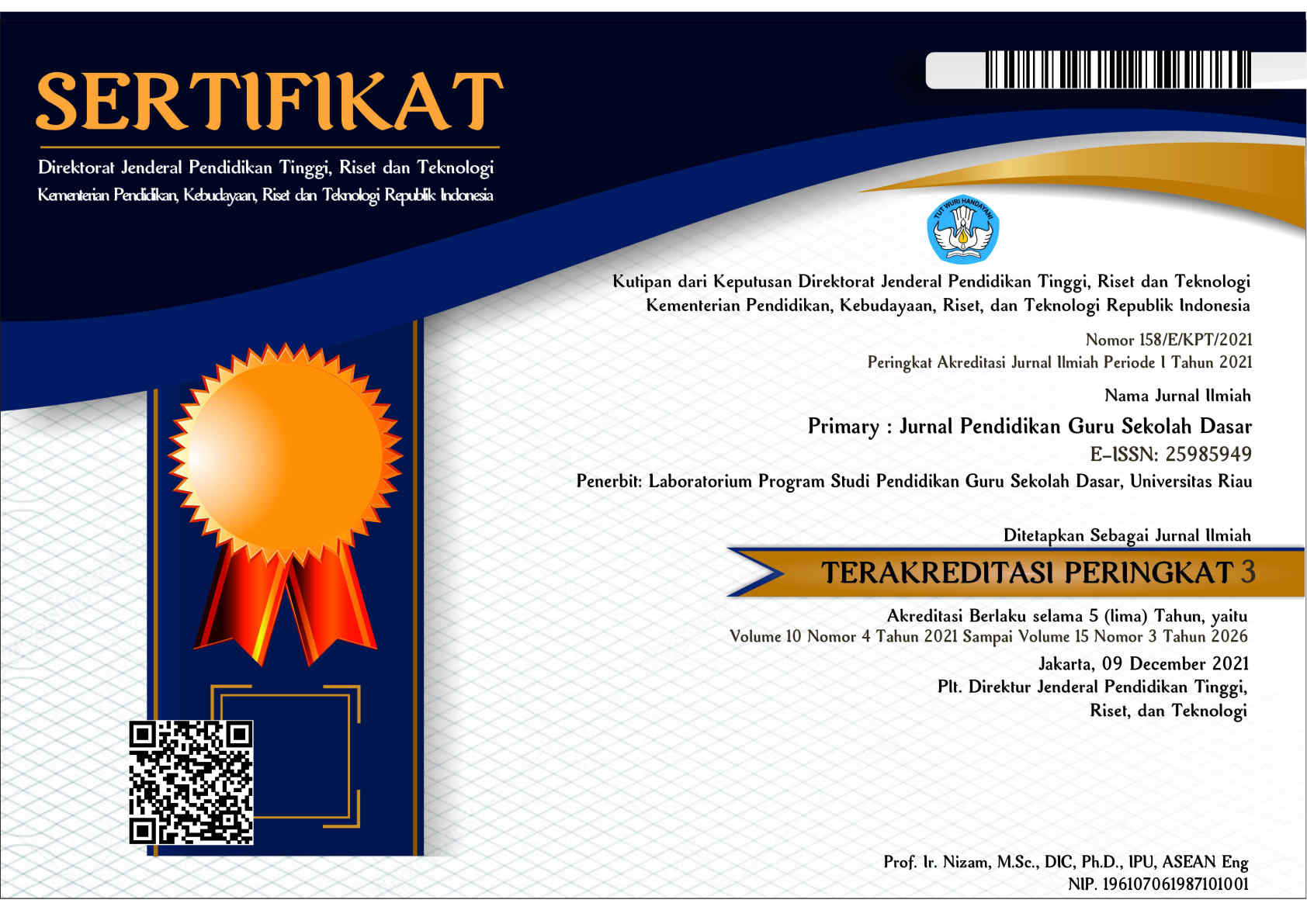Implementation Of A Character Education Program Through 5s Activities (Smile, Greetings, Sapa, Popular, Courteous) At State 100 Primary School Pekanbaru
Abstract
Keywords
Full Text:
PDFReferences
Arifin, I., & Wahyudi. (2008). Character Education Management Based on School Culture and Professionalism. (Malang: State University of Malang): Teacher: Theory and Research Studies.
Daryanto. (2015). Management of School Culture and Climate. Yogyakarta: Gava Media.
Faozah, I. (2015). Implementation of Character Education through the 5S (Smile, Greeting, Greeting, Polite, Polite) Program at SD Negeri 1 Sedayu, Sedayu District, Bantul Regency. Yogyakarta: Yogyakarta State University.
Gunawan, H. (2012). Character Education, Concept and Implementation. Bandung: Alphabeta.
Judiani, S. (2010). Implementation of Character Education in Elementary Schools Through Strengthening Curriculum Implementation. Journal of Education and Culture , Vol. 16, Page: 283.
Ministry of National Education. (2010). Development of Cultural Education and National Character. Jakarta: Ministry of National Education.
Ministry of National Education. (2011). Guidelines for Implementing Character Education. Jakarta: Book Curriculum Center.
Khotimah, ND (2018). Implementation of the Character Education Strengthening Program (PPK) through 5S activities in elementary schools. Educational Scientific Journal , Vol. 2 No. 1, Page: 29.
Koesoema, D. (2010). Character Education Strategy for Educating Children in the Global Age. Jakarta: Grasindo.
Kusuma, D. d. (2012). Character Education Study of Theory and Practice in Elementary Schools. Bandung: Rosdakarya.
Kusumaningrum, RA (2020). The Importance of Maintaining the 5s Cultural Values (Smile, Greeting, Greeting, Polite, Polite) in Elementary School Education. Journal of Science and Technology Education , Vol. 7 No. 1, Page: 25.
Maulidah, F. &. (2018). Implementation of 5S Culture (Smile, Greet, Greet, Polite, Courteous) at SDN Suruh Sidoarjo. PGSD Journal , Vol. 7 No. 4, Page: 3287.
Miles, MH, & Saldana. (2014). Qualitative Data Analysis. A Methods Sourcebook, Edition 3. USA: Sage Publication: Tjtjep Rohindi Rohidi Translation, UI-Press.
Moleong, L. J. (2012). Qualitative Research Methodology. Bandung: PT Teen Rosdakarya, Cet. Number 1.
Munah, B. (2015). Implementation of Character Education in Forming Students' Holistic Personalities. Journal of Character Education , Vol: 5 (1).
Muslich, M. (2011). Character Education Answers the Challenges of Multidimensional Crisis. Jakarta: PT. Literary Earth.
Nugrahani, F. (2014). Qualitative Research Methods in Language Education Research. Solo: Cakra Books.
Nuriyatun, P. (2016). Implementation of Character Education for Discipline and Responsibility in Bantul State Elementary Schools. Yogyakarta State University.
Nursapiah. (2020). Qualitative Research. Medan: Wal Ashri Publishing.
Omeri, N. (2015). The Importance of Character Education in the World of Education. Education Manager , Vol. 9 No. 3. Page: 465.
Sudrajat, A. (2011). Why Character Education? Journal of Character Education , Vol. 1 No. 1.
Sugiyono. (2009). Quantitative, Qualitative and R&D Research Methods. Bandung: Alphabeta.
Sugiyono. (2010). Understanding Qualitative Research. Bandung: CV Alfabeta.
Sujarweni, V., & Wiratna. (2014). Research Methods: Complete, Practical, and Easy to Understand. Yogyakarta: Pustaka Baru Press.
Sukmadinata, NS (2009). Educational Research Methods. Bandung: Rosdakarya Youth.
Thambu, N., Prayitno, HJ, & Zakaria, G. (2020). Incorporating Active Learning into Moral Education to Develop Multiple Intelligences: A Qualitative Approach. Indonesian Journal on Learning and Advanced Education (IJOLAE) , 17-29.
Zsantana, P. N., & Swanda, I. M. (2023). Strengthening Character and Moral Education Values Through the 5S (Smile, Greet, Greeting, Polite, Courteous) Program at SMK Negeri 1 Trenggelek During the Covid-19 Period. Moral and Citizenship Studies , Vol. 11 No. 1 Page: 222-236.
Zuchdi, D., Prasetya, Zuhdan Kun, & Masruri Mahsinatun Siasah. (2010). Development of an Integrated Character Education Model in Primary School Learning. Journal of Educational Horizons , Vol.1 (1).
DOI: http://dx.doi.org/10.33578/jpfkip.v12i5.10243
Refbacks
- There are currently no refbacks.
Copyright (c) 2023 Yuyun Aulia, Febrina Dafit

This work is licensed under a Creative Commons Attribution-NonCommercial-ShareAlike 4.0 International License.
____________________________________________________________
Primary: Jurnal Pendidikan Guru Sekolah Dasar
Secretariat
Program Studi Pendidikan Guru Sekolah Dasar
Gedung B1, FKIP Universitas Riau
Kampus Bina Widya Km. 12,5 Simpang Baru Panam
Pekanbaru Riau Indonesia 28293
e-mail : primary@ejournal.unri.ac.id



